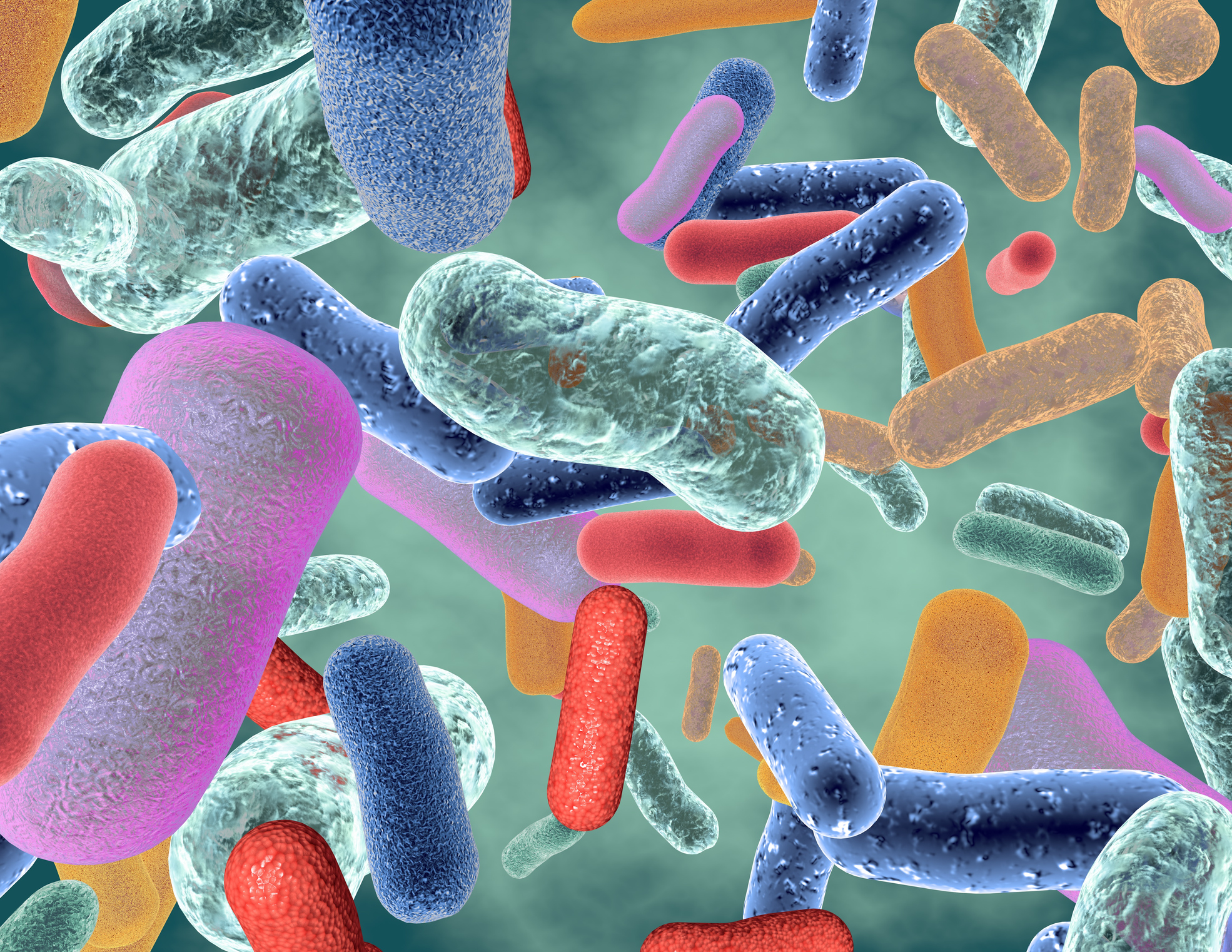Get Easy Health Digest™ in your inbox and don’t miss a thing when you subscribe today. Plus, get the free bonus report, Mother Nature’s Tips, Tricks and Remedies for Cholesterol, Blood Pressure & Blood Sugar as my way of saying welcome to the community!
Gut bacteria linked to high blood pressure and more than 2 dozen other diseases

You probably know by now that there are trillions of bacteria, both good and not-so-good, colonizing your body, billions of which live in your gut.
Over the years, researchers have been gradually learning all the ways in which this gut “microbiome” affects our health. For instance, they’ve discovered that when our gut bacteria are out of balance, it can lead to indigestion, constipation and discomfort, as well as a higher body mass index (BMI).
Now, researchers have uncovered the staggering extent to which the gut microbiome impacts health…
It turns out that bacteria can be directly tied to specific diseases. The connection they discovered is so strong that their research could lead to treatments based on specific bacteria and the disease they are associated with.
These researchers, who presented their findings recently at the European Society of Cardiology, revealed a link between higher levels of 11 bacteria (estimated from genetic data) that were associated with a total of 28 health and disease outcomes, including chronic obstructive pulmonary disease (COPD), high blood pressure, high cholesterol and BMI. In one example, they found that the higher the level of Ruminococcus bacteria, the greater the risk of high blood pressure.
It’s amazing to think that we’ll someday be able to treat certain diseases by making tweaks to our gut bacteria. But what can you do until then? You can begin improving your own gut health right away by taking these steps…
Stop drinking (almost all) alcohol
Overall, diets that are high in animal proteins, saturated fat, sugar and salt can stimulate the growth of “bad” bacteria and inhibit “good” bacteria, which could result in potential damage to the intestinal barrier.
Alcohol is particularly bad for gut health. Studies show drinking a lot of alcohol can encourage the growth of some not-so-healthy bacteria in our gut, including one known as Methanobacterium which causes methane in the breath as a byproduct. Patients with colorectal cancer produce higher levels of methane in their breath than patients who are cancer free.
According to study author Dr. Hilde Groot of University Medical Centre Groningen, the Netherlands, “What we eat and drink is connected to microbiome content, so we studied the links with meat, caffeine and alcohol. We observed a relationship between raised levels of Methanobacterium and drinking alcohol more often. It is important to stress that this is an association, not a causal relation, and more research is needed.”
Alcohol can also alter gut microbiome composition in ways that can lead to inflammation and leaky gut, a condition that damages the intestinal lining and allows undigested food particles, toxic waste products and bacteria to escape the intestines and circulate throughout the body. These foreign substances can cause inflammatory and allergic reactions leading to conditions such as migraine, irritable bowel, eczema, chronic fatigue and alcoholic liver disease (ALD).
There is one notable exception to the “alcohol-is-bad” rule. Studies have found that people who drink red wine have a greater diversity of bacteria living in their gut than people who drink beer, cider, white wine or spirits. The polyphenols in red wine, including resveratrol, are thought to have something to do with this, given their antioxidant properties. But this isn’t an excuse to overindulge — the study showed that as little as one glass of red wine every two weeks was enough to observe the effect.
Skip the steak
Another culprit in bad gut health is red meat. Diets that are high in red meat have been linked in studies to colon cancer, heart disease and stroke, among other diseases. One reason for this could be the effect red meat consumption has on the gut microbiome. Researchers at Cleveland Clinic identified a molecule known as Trimethylamine N-oxide (TMAO) that plays a role in causing heart disease. And they found that eating animal products, especially red meat, causes gut microbes to produce TMAO.
Another study identified a type of sugar found in red meat that is chopped off in your gut and recycled into the body. This foreign sugar is then taken into the body’s cells, causing antibody production and creating inflammation.
Eat lots of plants
So, what can we eat to ensure a healthy, happy gut microbiome? Make sure you consume plenty of healthy dietary fiber and plant protein, both of which are connected with an increase in “good” gut bacteria. Getting omega-3, polyphenols and micronutrients is also wise, since they potentially benefit the gut microbiome. The Mediterranean Diet is a solid choice for good gut health, given its emphasis on fruits, vegetables, olive oil, nuts, legumes and whole grains.
You’ll be glad to know you don’t need to give up your morning cup of coffee — caffeine is believed to help stimulate healthy gut microbes. In one study, higher caffeine consumption was linked with a more robust and balanced gut microbiome, higher levels of anti-inflammatory bacteria and lower levels of potentially harmful bacteria.
Add pre- and probiotics
Prebiotics and probiotics are another healthy addition to your gut microbiome. Probiotics add to the population of “good” bacteria in your gut, while prebiotics are specialized plant fibers that act as food for the “good” bacteria. It’s especially important to add prebiotics and probiotics to your diet if you’ve recently taken antibiotics to fight off an infection. Antibiotics can kill the good bacteria in your gut along with the bad.
You can obtain prebiotics and probiotics from food or supplements. Some ideal food sources for prebiotics are bananas, berries, beans and legumes, oats, onions, garlic and vegetables like dandelion greens, asparagus and leeks. And you can get probiotics from fermented foods like yogurt, miso soup, sauerkraut, kimchi, kombucha, kefir and pickled vegetables.
If you do decide to add a probiotic supplement to your diet, note that there are many different kinds, each of which contains different strains that address different conditions. Ask a dietician or health care professional to help you choose the one that’s right for you.
Editor’s note: Did you know that when you take your body from acid to alkaline you can boost your energy, lose weight, soothe digestion, avoid illness and achieve wellness? Click here to discover The Alkaline Secret to Ultimate Vitality and revive your life today!
Sources:
Gut microbes could unlock the secret to healthy aging — Science Daily.
Biochemical tests in diseases of the intestinal tract: their contributions to diagnosis, management, and understanding the pathophysiology of specific disease states — Critical Reviews in Clinical Laboratory Sciences.
The Gastrointestinal Microbiome: Alcohol Effects on the Composition of Intestinal Microbiota — Alcohol Research Current Reviews.
10 Signs You Have a Leaky Gut—and How to Heal It — HealthyWomen.
Red wine drinkers have more diverse gut bacteria than other drinkers — New Scientist.
Gut Microbes Could Finally Settle the Debate Over Whether Red Meat Is Unhealthy — leapsmag.
Food Components and Dietary Habits: Keys for a Healthy Gut Microbiota Composition — Nutrients.
What’s the Difference Between Probiotics and Prebiotics? — SCL Health.
P1916 Caffeine Consumption and the Colonic Mucosa-Associated Gut Microbiota — American College of Gastroenterology.














